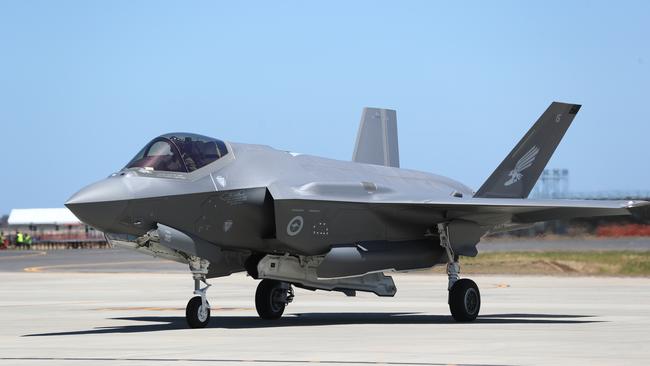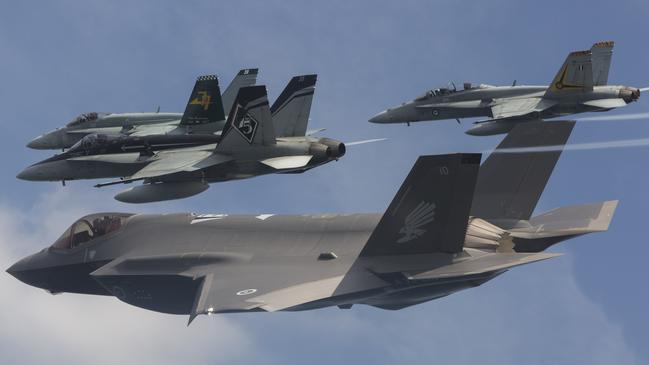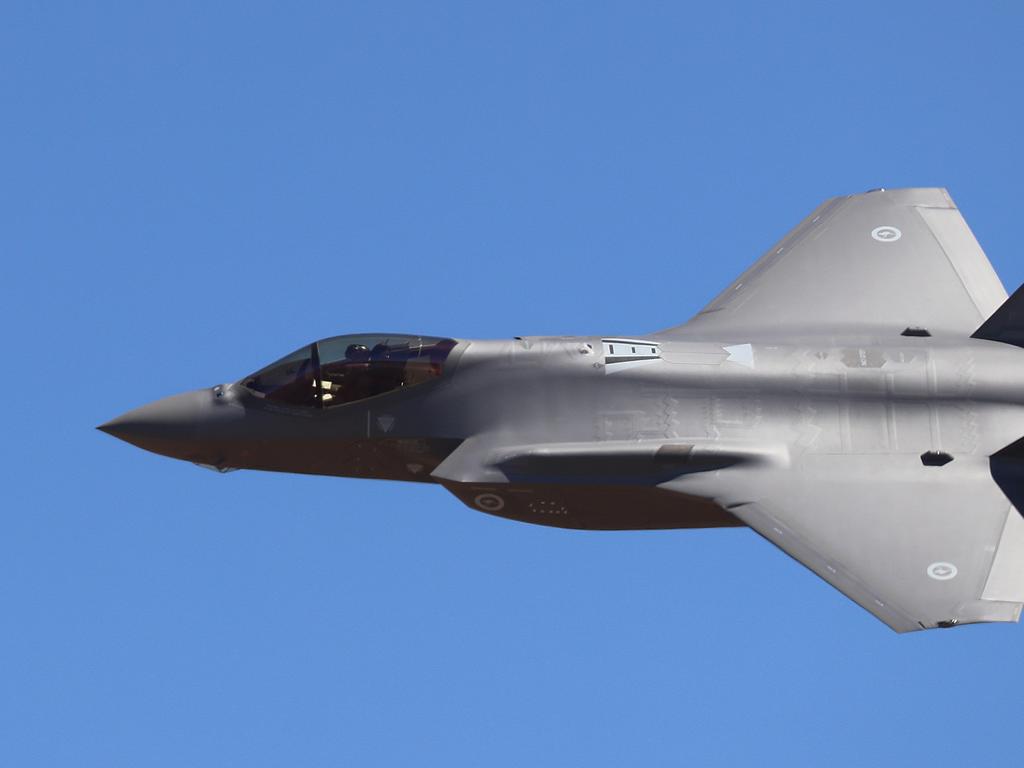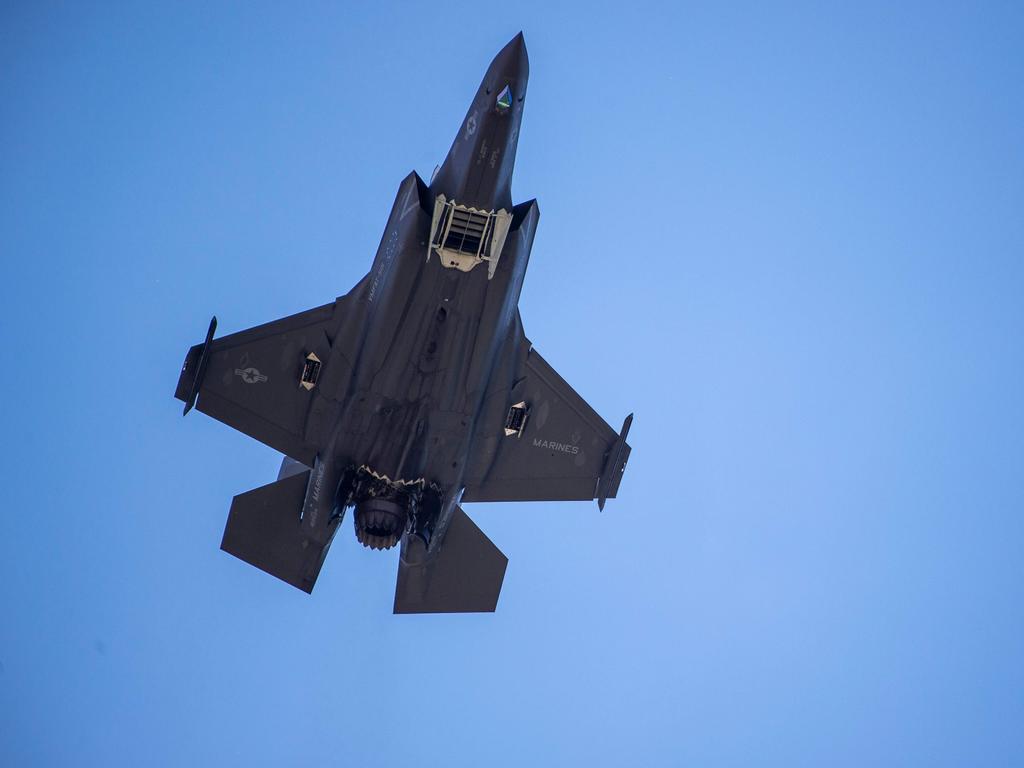Trump threat to Australian Joint Strike Fighter jobs, contracts
Scott Morrison says a US threat that could cost Australia jobs and Joint Strike Fighter contracts should be treated with ‘caution’.

Scott Morrison has dismissed concerns Australian manufacturers could lose billions in contracts in the Joint Strike Fighter program after Donald Trump threatened to end offshore manufacturing of parts for the warplane.
The Prime Minister said President Trump’s comments on overseas manufacturing of parts of the F-35 warplane should be viewed with caution, and that Australia could rely on current arrangements.
“We have our contracts and arrangements in place as suppliers into the programs. We will continue to pursue those contracts as they have been set out,” Mr Morrison said. “So, I would caution against getting too far ahead of oneself when it comes to reading into the statements that have been made,” he said.
Mr Morrison’s comments came as senior defence industry executives played down the likelihood of the US making good on Mr Trump’s threat, dismissing it as pre-election posturing.
Labor urged the government to provide an assurance the contracts were secure.
Under the Joint Strike Fighter project, Australia has agreed to buy 72 of the aircraft as part of a $17bn program to replace the ageing F/A-18A/B Classic Hornets, which have been in service with the RAAF since 1985.
In an interview with Fox News, President Trump criticised the decision to spread manufacturing of the F-35 across US allies as “crazy”, saying he would change US policy to bring construction of the fighter jets back to US factories.
“As an example, we’re making a fighter jet. It’s a certain fighter jet, I won’t tell you which, but it happens to be the F-35,” he said.
“It’s a great jet, and we make parts for this jet all over the world. We make them in Turkey, we make them here, we’re going to make them there. All because President (Barack) Obama and others — I’m not just blaming him — thought it was a wonderful thing.
“The problem is, if we have a problem with a country, you can’t make the jet. We get parts from all over the place. It’s so crazy. We should make everything in the United States,” he said.
“We’re doing it because I’m changing all those policies.”
Senior defence industry executives, who said they could not comment on the record, said Mr Trump’s comments were likely little more than posturing ahead of the upcoming US election.
“It sounds impossible to implement. But if it were US government policy it would have a big impact here,” one said.

But if carried through, the move would throw a key plank of the federal government’s defence industry policy into disarray, potentially threatening thousands of local jobs through the cancellation of billions in manufacturing and support contracts with Australian companies.
Led by Lockheed Martin’s Australian arm, the US defence establishment has already handed out about $2bn worth of contacts for the F-35 over the last few years, with Geelong-based Chemring Australia winning a $107.5m contract to make countermeasure flares as recently as early May.
Defence sector lobby group Industry Voice warned the threat would throw the entire project into chaos if it was carried out.
“Every member country that signed up under a certain regime. There were premiums paid to have the manufacturing done the way they did it,” its CEO Brent Clark said.
“The only logical thing would be for the Australian government to suspend the contract and renegotiate the whole thing. It would be madness.”
According to Lockheed, more than 50 Australian companies are involved in the F-35 supply chain in one form or another, with Defence Minister Linda Reynolds saying in May the program had already created almost 2400 local jobs.
The federal government has said Australia’s partnership in the F-35 program will create more than 5000 jobs by 2023.
Last June President Trump kicked Turkey out of the Joint Strike Fighter program after the NATO ally elected to buy a Russian air defence system.
The decision came at a substantial cost to the program, with the US government audit office recently estimating it would add an additional $US1.5bn to annual manufacturing costs. But the Trump administration has shown no signs of backing away from its decision.
While it is unclear whether the US administration will follow through on the President’s latest threats, they throw a shadow over hopes that Australian manufacturers could benefit from the decision to expel Turkey from the program.
ASX-listed Quickstep Holdings has significant contracts to supply carbon fibre materials to the JSF program, including parts for the vertical tail frame. The company, which has 270 employees at its Sydney facilities, says it supplies more than 30 individual components for the F-35, with content on every aircraft produced.
The US Department of Defence declined to comment on President Trump’s comments, referring them to the White House itself.
“The department remains fully committed to the F-35 program, and maintaining a competitive edge with its unique, unmatched 5th generation capabilities. We will continue to aggressively reduce F-35 cost, incentivise industry to meet required performance, and deliver advanced capabilities to our warfighters at the best value to our taxpayers,” said a spokesman.
President Trump’s comments have the potential to upset US relations with its allies far beyond the jobs and contracts in Australia. More than 300,000 parts go into an individual fighter plane, many made with contributions offshore, but assembled in the US.
The entire international program was partly designed to deliver local jobs to US allies to help allied governments argue that the enormous costs of buying the fighters was at least partly offset by the boost to local economies.
Defence industry executives who played down the President’s warning also pointed to the recent US accountability office report over problems caused by the decision to cut Turkey from the program, saying it showed how complex the F-35 supply chain was.
“Chopping Turkey out cost them billions, unravelling everything else would set them back years. And Australia is a trusted partner, so we’d be last in line even if they did,” he said.
Opposition defence spokesman Richard Marles urged the government to ensure the Joint Strike Fighter contracts were secure.
“Australia has a proud defence manufacturing industry and we would expect the Minister for Defence to be going into bat for them. In fact, it was only earlier this month that the Minister was trumpeting how close her ties were with the United States. These defence contracts are vital to Australian jobs and Australian companies.”
Mr Marles said job certainty was vital at a time of anxiety for Australian workers.
“We would expect the minister to be working around the clock to ensure these contracts with Australian defence companies are secure. It is really important that we hear from the minister on this, to provide certainty to the companies and their workers.”








To join the conversation, please log in. Don't have an account? Register
Join the conversation, you are commenting as Logout